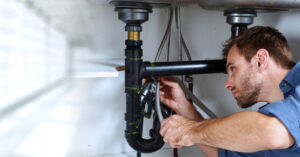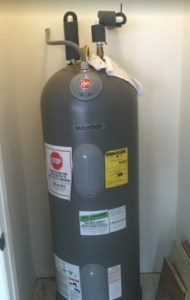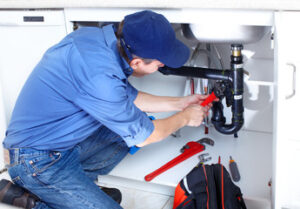Residential Plumber Edison NJ installs, repairs, and maintains plumbing systems in homes. They also inspect sewer lines and drains. Residential plumbers can help with problems such as clogged sinks, leaky pipes, and water heater issues.

There are significant differences between commercial and residential plumbing services. Residential plumbers deal with less complex plumbing and fewer users.
The plumbing profession encompasses a wide range of services and projects, from installing and maintaining pipes to repairing drains and toilets. Nevertheless, the work is usually categorized into two sectors—commercial and residential plumbing. Commercial plumbing involves working with large-scale water supply systems in various commercial buildings, while residential plumbers focus on solving household issues like leaky faucets and clogged drains.
Residential plumbing maintenance includes checking for and fixing leaks, clogged toilets, and faulty hot water heaters. It also entails cleaning drains and septic tanks to prevent buildup and odors. In addition, it includes replacing worn-out components such as gaskets, washers, and valves. Furthermore, it involves rerouting water and sewer lines when a house is undergoing renovation or an extension is added to the original structure.
A residential plumber is also responsible for installing and repairing gas line appliances such as stoves and water heaters. They also ensure that the gas lines are properly connected and maintained to avoid fire hazards.
Another significant function is inspecting drainage systems and documenting problems. They may also clean out and install new sewer lines with pipe cutters, threading machines, bending machines, soldering guns, and caulking tools. Moreover, they may be called to repair domestic appliances such as washing machines and dishwashers.
Residential plumbers generally interact with customers on a daily basis, requiring them to have excellent customer service skills. In addition, they must be able to understand and follow complex building blueprints and specifications. They also need to have sufficient knowledge of zoning laws and codes. In contrast, a commercial plumber spends most of his time working on plumbing systems in high-rise office buildings, retail outlets, warehouses, and industrial facilities. These systems typically serve multiple occupants and require higher-grade fixtures that can withstand greater usage demands. They are also required to follow stringent safety and health standards. Therefore, it is important for people to choose the right plumber for their homes or business premises. This will help them get quality services at reasonable prices. Moreover, it will save them from costly repairs and replacements in the future.
Installation
Residential plumbers install plumbing fixtures and appliances in homes. This includes sinks, bathtubs, toilets, water heaters, and more. They also connect new appliances to the home’s plumbing system, such as dishwashers and washing machines. These installations often require new pipes and drain lines. Residential plumbers can also install whole-home water filtration systems. These systems can help reduce the amount of harmful chemicals and bacteria in home water.
Residential plumbing services also include repairing and installing sewer systems. If a sewer line gets clogged, it can back up into your home and cause severe damage. Residential plumbers use special tools to clean out sewer lines and restore them to their proper function. They can also repair sewer backups caused by tree roots, grease, or poor drainage design.
Another common service residential plumbers offer is installing new hot water heaters. Old water heaters can break down or become inefficient, and new ones can save you money on your utility bills. A qualified residential plumber will be able to recommend the right water heater for your home and install it quickly and efficiently.
Commercial plumbers work on larger-scale plumbing projects in commercial buildings, including office buildings, apartment complexes, shopping centers, hospitals, and more. These types of buildings typically have more complicated plumbing systems and higher usage rates than residential properties. Commercial plumbing requires specialized training and experience, as well as knowledge of health and safety regulations.
When it comes to maintenance, both residential and commercial plumbers must keep up with industry trends and practices. They must also have strong problem-solving skills and the ability to fix a wide range of plumbing issues. Residential plumbers must also provide excellent customer service when communicating with homeowners about their plumbing problems.
Choosing the right plumber can make all the difference in your home’s plumbing system. A qualified plumber can help you avoid costly repairs and keep your plumbing running smoothly for years to come. If you’re looking for a reliable and knowledgeable plumber, contact Ajax Plumbing & Heating Corp in New York. They have over 60 years of experience and can handle all your plumbing needs.
Repair
Plumbing problems can arise at any time, and the most important thing is to get them fixed as quickly as possible to prevent further damage. Residential plumbers offer a range of repair services, from fixing leaky faucets to installing new water heaters. They also have the skills and tools to reroute pipes when needed, and they can inspect and diagnose issues like clogs and broken fixtures.
Homeowners often use more water than commercial spaces, so their plumbing systems are more prone to wear and tear. Leaking drains, faulty toilets, and noisy pipes are common complaints that residential plumbers hear about. These issues can be easy to fix with regular maintenance, but they may require more serious attention if left unchecked.
Licensed residential plumbers are trained to perform new installations as well as repairs, including re-piping. This service is useful for older homes with outdated or damaged systems, as it can help improve efficiency and reduce energy costs. They can also assist with kitchen and bathroom renovations by replacing old appliances with newer, more efficient models.
Commercial plumbing is a bit more complex than residential, and it requires more advanced training and experience. Commercial plumbers work on large buildings like offices, malls, and hospitals. Their responsibilities include installing and maintaining complex pipework, drainage systems, and toilets. They also use special equipment to handle hazardous materials, such as chemicals and medical waste.
While it’s less common for businesses to have plumbing issues, they do happen. These problems are typically more complicated and time-consuming to fix, as plumbers must assess the entire system and its components to determine the source of the issue. Commercial plumbers must also have strong customer service skills to communicate with building owners and explain the issue in detail.
Another common problem that commercial plumbers face is snaking drain lines. These issues are usually more difficult to resolve than a simple clog, as the plumber must trace the line from the affected unit all the way to the sewer main. This can be a time-consuming process, especially in high-rise buildings. This is why it’s important to hire a plumber with experience working on different types of systems and locations.
Replacement
Residential plumbers offer a variety of replacement services for pipes, fixtures, and appliances. For instance, if your water heater is on the fritz, they can install a new one in your home. In addition, they can replace your toilets, faucets, shower heads, and other components. Moreover, they can also repair or replace your sewer line. A clogged drain or sewer line can be a serious problem. It could lead to flooding, waste buildup, and other issues. Plumbers can use specialized tools to clear the blockage and restore your plumbing.
Residential plumbing systems differ from commercial ones. Therefore, you need to find a plumber with the right experience. A residential plumber will have a better understanding of your home’s plumbing system.
When hiring a plumber, look for one with experience in both residential and commercial plumbing. This will ensure that they can tackle any issues with your plumbing system, whether it’s a minor leak or a major sewer backup.
Another important consideration is whether the plumber can handle large-scale projects. Some plumbing companies only work on small jobs, while others take on commercial and industrial projects. Make sure to ask about their previous projects so that you can determine if they’re the right fit for your needs.
In addition to being experienced in residential plumbing, a good plumber should have excellent customer service skills. They should be polite and friendly when answering your questions, and they should be able to explain the work they’re doing in a way that’s easy to understand.
While residential plumbing can be complex, the skills and knowledge required to perform it well are worthwhile. In fact, it’s the best way to ensure your plumbing systems are working properly and efficiently.
There are many different types of plumbing systems, and each type requires its own unique set of skills. While some of these systems are more complicated than others, all of them need regular maintenance to ensure they are functioning properly. If you are looking for a plumber to help with your plumbing needs, consider choosing a residential plumber who is licensed and insured.








